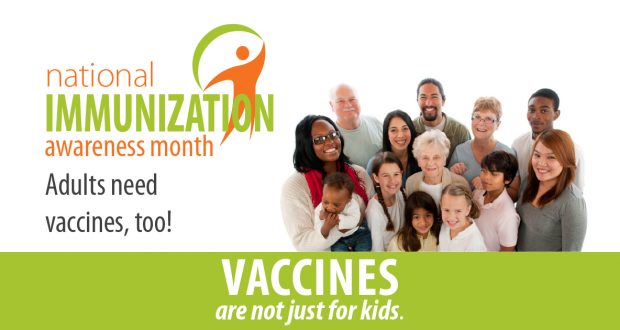By: Red Hot Mamas
Published: August 4, 2018
You want to pass on certain things like family traditions, a grandmother’s quilt or dad’s love of books—but no one wants to pass on a serious illness. Take charge of your health and help protect those around you by asking about vaccines at your next doctor’s visit.
Vaccinating our children is commonplace in the United States. But many adults don’t know which vaccines they need, and even fewer are fully vaccinated. Every year, thousands of adults in the U.S. become needlessly ill from infectious diseases. Many adults are hospitalized and some even die from diseases that could be prevented by vaccines.
Not only can vaccine-preventable diseases make you very sick, but if you get sick, you may risk spreading certain diseases to others. That’s a risk most of us do not want to take. Babies, older adults and people with weakened immune systems (like those undergoing cancer treatment) are especially vulnerable to infectious diseases. They are also more likely to have severe illness and complications if they do get sick. You can help protect your health and the health of your loved ones by getting your recommended vaccines.
The good news is that getting vaccinated is easier than you think. Adults can get vaccinated at doctors’ offices, pharmacies, workplaces, health clinics and health departments. Visit vaccinefinder.org to help find a vaccine provider near you. Most health insurance plans cover the cost of recommended vaccines—a call to your insurance provider can give you the details.
What vaccines do you need?
All adults should get:
* Annual flu vaccine to protect against seasonal flu
* Td/Tdap to protect against tetanus, diphtheria and pertussis (whooping cough)
Some additional vaccines you may need (depending on your age, health conditions and other factors) include:
* Hepatitis A
* Hepatitis B
* Human Papillomavirus (HPV)
* Meningococcal
* Pneumococcal
* Shingles
Traveling overseas? There may be additional vaccines you need depending on the location. Find out at https://wwwnc.cdc.gov/travel.
Still not sure what vaccines you may need? The CDC offers a short quiz at www.cdc.gov/vaccines/adultquiz to help find out which vaccines you might need. You can take the results of your quiz to your provider to discuss which vaccines are right for you.
All adults should get an annual flu vaccine to protect against seasonal flu and a Td vaccine every 10 years to protect against tetanus and diphtheria. You may also need other vaccines based on your age, health conditions, occupation and other factors. If you are planning to travel outside of the U.S., check on any additional vaccines you may need. Some travel-related vaccines are part of a series or are needed months prior to your travel to be most effective, so be sure to plan ahead.
For more information about adult vaccines: www.cdc.gov/vaccines/adults.
 Red Hot Mamas In Charge of Change.
Red Hot Mamas In Charge of Change.




